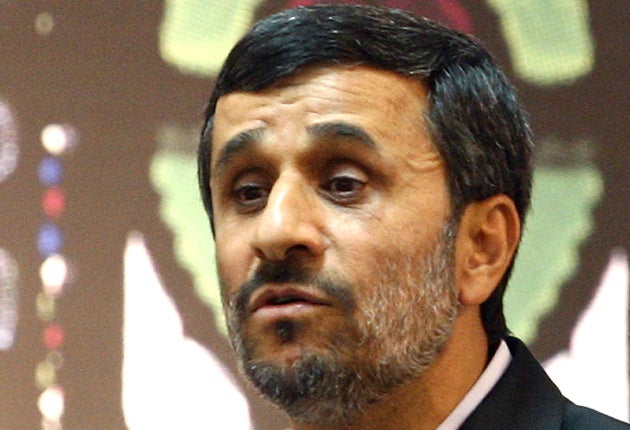Iranian President Mahmoud Ahmadinejad was unharmed by an attack with a homemade explosive device on his motorcade during a visit to the western city of Hamadan today, a source in his office said.
The source said Ahmadinejad's convoy was targeted as he was travelling from Hamadan's airport to give a speech in a local sports arena. The president was unhurt but others had been injured in the blast. One person was arrested.
"There was an attack this morning. Nothing happened to the president's car," the source told Reuters. "Investigations continue ... to find out who was behind it."
Ahmadinejad, who has cracked down on opposition since a disputed June 2009 presidential election, appeared on live Iranian television at the sports stadium. He looked unperturbed and made no mention of any assault.
The populist, hardline Ahmadinejad has accumulated enemies in conservative and reformist circles in the Islamic Republic as well as abroad.
Al Arabiya television said an attacker had thrown a bomb at Ahmadinejad's convoy before being detained. Dubai-based Al Arabiya cited its own sources as saying the bomb had hit a car carrying journalists and presidential staff.
There was no immediate claim of responsibility.
The main Iranian state television channel remained silent about the explosion, while the English-language state news channel Press TV denied there had been any attack.
The semi-official Fars news agency, after initially reporting a man had thrown a home-made grenade, later changed its story to say a firecracker had been set off by a man who was excited to see the president.
Ahmadinejad's government is facing economic pain as new foreign sanctions imposed over Iran's disputed nuclear energy programme bite on the world's fifth biggest oil exporter.
Iranian leaders have responded to the pressure by accusing the West of plotting against the Islamic Republic. Domestic opponents are accused of being backed by foreign powers.
On Monday, during a speech to a conference of expatriate Iranians in Tehran, Ahmadinejad said he believed he was the target of an assassination plot by Israel. "The stupid Zionists have hired mercenaries to assassinate me," he said.
But one opposition activist said it was a very different thing for the president to talk of attacks and for an attack to actually take place.
"It is obviously a reflection of the fact that all is not well in Iran and control is not total, contrary to conventional wisdom," said Mehrdad Khonsari, a London-based Iranian opposition activist.
One of Ahmadinejad's trademarks has been constant travel around his vast country to deliver provocative speeches before outwardly adoring crowds who shout "death" to Iran's foes.
Several armed groups opposed to the government are active in Iran, mostly ethnic Kurds in the northwest, Baluch in the southeast and Arabs in the southwest.
The banned Mujahideen Khalq, listed by the United States as a terrorist group, carried out many anti-government attacks after the 1979 Islamic revolution. It was blamed for two 1981 bombings that killed dozens of senior officials in Tehran, including the president and prime minister.
But Shahin Gobadi, French-based spokesman for the Mujahideen, now part of an opposition coalition known as the National Council of Resistance of Iran, denied involvement.
Asked if his group was behind the attack, he said: "Absolutely not, absolutely not. It has nothing to do with us. I don't know what happened but it has nothing to do with us."
Ahmadinejad recently sought to isolate rival political factions by declaring that "the regime has only one party, which is the velayat" - a reference to Shi'ite Islam's hidden Imam, for now represented by Supreme Leader Ayatollah Ali Khamenei.
Just as combative towards external pressure, the president has derided sanctions over Iran's nuclear programme as "pathetic" and vowed to pursue what Iran says is a quest for nuclear energy, not weapons as the West believes.
On Monday, Ahmadinejad called on US President Barack Obama to face him in a televised one-on-one debate to see who has the best solutions for the world's problems.
Ahmadinejad, backed by Khamenei and the elite Revolutionary Guards, crushed street protests that greeted his disputed re-election in June 2009, although he has yet to silence losing reformist candidates Mirhossein Mousavi and Mehdi Karoubi.
The president, first elected in 2005, also seems bent on displacing an older layer of conservative leaders and clerics whose influence dates back to the 1979 Islamic Revolution.
Subscribe to Independent Premium to bookmark this article
Want to bookmark your favourite articles and stories to read or reference later? Start your Independent Premium subscription today.


Join our commenting forum
Join thought-provoking conversations, follow other Independent readers and see their replies